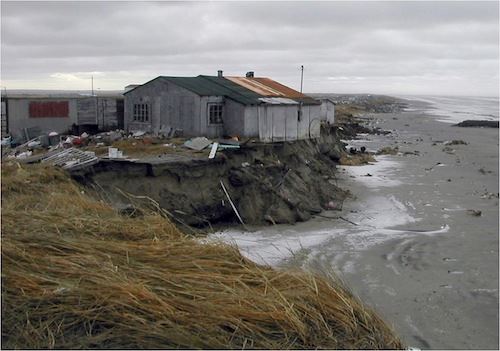New Research Center to Help Communities Affected by Climate Change

We want to hear from you: Help us create a National Science Foundation Engineering Research Center to serve the Arctic!
Fill out this online questionnaire.
A significant number of coastal Alaska communities are threatened with erosion, flooding, and the loss of clean water and infrastructure in the next decade due to the amplified effects of climate change in the Arctic. Similar climate changes and their effects are occurring throughout the world. Alaska can serve as a microcosm for coordinated and sustainable energy and infrastructure development for human displacement challenges and resilience worldwide.
The University of Alaska Fairbanks has been funded by the National Science Foundation for a year-long planning grant to develop an Engineering Research Center proposal and is currently seeking input from interested stakeholders. The ERC will develop integrated solutions for communities threatened and displaced by climate change. The ultimate goal will be to create communities and economies based on sustainable use of local and renewable resources. Key elements of the ERC planning effort and eventual proposal will include workforce development, implementation processes, research, and technology innovation with diverse partners across the state. The university recognizes ongoing efforts around the state to help threatened communities and does not seek to supplant those efforts, but rather, to complement and focus them in a manner that adds value and results in long-term sustainability and new approaches that translate across the country and beyond.
The goal of the NSF ERC Program is to integrate engineering research and education with technological innovation to transform national prosperity, health and security. ERCs create an innovative, inclusive culture in engineering to cultivate new ideas and pursue engineering discovery that achieves a significant science, technology and societal outcome within the 10-year time frame of NSF support. For information on individual ERCs and their achievements, go to http://ERC-assoc.org.
The University of Alaska personnel involved with this planning grant are Erin Whitney (UAF/ACEP), principal investigator; Mariko Shirazi (UAF/ACEP), Pips Veazey (UAF), Margaret Darrow (UAF), Frank Witmer (UAA) and Bill Schnabel (UAF), co-investigators; and Mark Masteller (UAF/Bristol Bay Campus), fellow.
Photo by Tony Weyiouanna
A house in Shishmaref, a village on Alaska’s northwest coast, hangs over the edge
of a cliff after Typhoon Tokage in 2004. The house fell onto the beach after erosion
cut under it in subsequent years.


